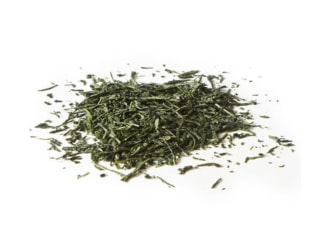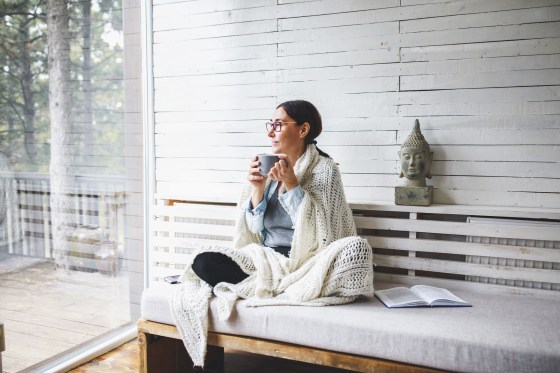
6 best teas for mental and physical health
From earthy matcha green tea to mild oolong, here are some of the best teas for your health.
Michelle No


Michelle No


Some — but not all — senchas (a type of green tea high in L-theanine) are partially shaded to increase their production of L-theanine. Ayame Kabuse is one such sencha variety that’ll deliver refreshing, umami flavors reminiscent of Gyokuro.
For a more accessible tea high in L-theanine, look to matcha, the aforementioned green tea with a high concentration of the amino acid. Produced by grinding the whole shaded green tea leaf down into a powder form and then whisking that powder in a bowl with hot water, matcha has recently become a more popular tea flavor.
Pettigrew admitted that the taste is “intense,” though, and that adding it to a latte, or blending half a teaspoon of it with almond or oat milk, a banana and a bit of honey is a perfectly acceptable way to tone the flavor down. To find the best matcha, Pettigrew said that the tea should be “bright emerald green and have a certain sweetness,” but that it should always have a plant-esque flavor profile. The Soukou Matcha is one tea that checks every box.
Another type of tea that many experts recommended — and that I’ve personally fervently embraced as well — is oolong. Oolong teas are lightly caffeinated, and their mild flavors can range from light and floral to roasted with a smokey undertone. Another reason oolong teas can be great for a mindful, meditative tea ritual is because their loose leaves are ball- or twisty-shaped and therefore lend themselves to an amazing visual experience when steeped in hot water.
“Besides their flavor, I love how oolong tea leaves unfurl, open up, kind of demand your attention and allow you to go into a contemplative mode,” said tea educator and consultant Anna Ye. Try out Nantou Four Seasons, an oolong that’s milky, floral and has beautiful unfurling leaves. Because oolong tea leaves are so dense, Ye said, they’re also great to drink without a strainer in an unfussy bowl or small tea cup.
Emphasizing the mental health benefits of drinking tea, Diana Zheng, co-founder of Three Gems Tea, says, “There’re definitely compounds in tea that have physiological effects on the body, but I like to focus more on the intentionality of brewing tea and making it a ritual: Enjoying the smells, the taste, the texture, the feel of the cup, looking at the leaves after they’ve unfurled. It’s an everyday luxury and a nice way to treat yourself.”
We can’t talk about tea without at least dipping into the world of decaffeinated herbal teas. Here, taste, smell and look are at an even higher premium. And while you won’t enjoy the health benefits of caffeine with a decaffeinated tea, these can be good for people with high anxiety levels, as studies have shown that large amounts of caffeine can trigger anxiety and depression in people with mental health disorders.
To beat my afternoon slump, I usually reach for a turmeric chai, which I sweeten up with a few drops of oat milk. It’s just spiced enough to wake me up, but won’t disrupt my sleep schedule at night.
Lemon Verbena is another one that both Ye and Zheng recommended. “It blows my mind that it’s from a single plant because there are so many flavors packed into this one leaf,” said Zheng. “It has the lemon flavor and the tang, but also a floralness and sweetness. There’s also a lingering spice, almost like a black pepper. Overall, it feels really refreshing.”
Though herbal infusions aren’t technically “teas” since they’re not derived from tea leaves — and we can’t prescribe tea’s many health benefits to them — many are known for other good-for-you benefits. For example, peppermint tea is associated with lowered IBS symptoms, chamomile is associated with sedative properties and rooibos is associated with a high level of antioxidants. Just like with tea, however, many of these studies aren’t conducted with the rigor of randomized control trials, so it’s impossible to specifically prescribe teas for any of these ailments.
As a lightweight and small item, tea is one of the best items to buy online. But one of the bigger questions people wrestle with is whether to buy loose leaf or bagged teas. Because paper tea bags conceal their contents, they’re often made with lower quality tea leaves. For this reason, most experts recommend going for loose leaf tea. But if you love tea bags for their convenience, Pettigrew suggested going for pyramid tea bags, which are made out of a biodegradable material and are often filled with large tea leaves that unfurl just as they do with loose leaf tea servings. This way, you can have your tea and drink it too.
Catch up on Select's in-depth coverage of personal finance, tech and tools, wellness and more, and follow us on Facebook, Instagram and Twitter to stay up to date.